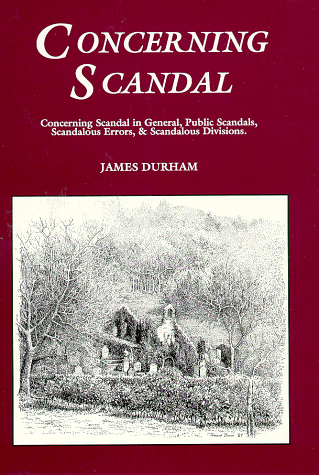
Concerning Scandal, reviewed in Banner of Truth, Issue 337, by Austin R. Walker.
This well-bound hardback volume is a new edition of James Durham’s dying testament to the Church Scotland. Written in the 1650s, at a time when the Presbyterian Church in Scotland suffered a serious division among its leaders, this treatise was his attempt to reconcile the opposing parties. It grew out of his studies in Revelation 2, in particular Christ’s letter to the church at Pergamos.
By ‘scandal’ Durham meant offences, matters that cause division and impede spiritual growth between individual Christians, Christian leaders and Christian churches. He observed in his day offences being given and taken.
The book is divided into four parts — Part One: Concerning Scandals in General — dealing with offences between individual Christians. Part Two — Concerning Public Scandals — dealing with church discipline. Part Three: Concerning Doctrinal Scandals — dealing with the spread of error in the church. Part Four: Concerning Scandalous Divisions — dealing with divisions between godly men occasioned by such things as different outlooks and practices.
The editor has spared no effort to make this old classic readable and useful. He has restructured chapters, provided footnotes, translations from Latin quotations, a glossary of obsolete terms, an extended table of contents and a topical and Scriptural index. However, the book will, I fear, still have a limited readership. That does not in any way negate the importance of the issues. Few books are written today on these matters and as far as the reviewer knows, none are as substantial as Durham. Even a glance through the extended table of contents will show the comprehensive nature of Durham’s work.
Some 350 years have passed since Durham wrote these words. Sadly, heresy, schism and division have abounded. He would have had no sympathy with the modern ecumenical movement, but surely would have wept over the state of evangelicalism today. Anyone who weeps with him, concerned with the purity, unity, peace and prosperity of the church of God should take to heart his presentation of biblical principles and his reasoned arguments and pleas. No reader will agree with him at every point. The value of the book lies: (1) in bringing the matter of ‘scandal’ to our attention and attempting to enunciate biblical principles; (2) in stimulating us to rethink our attitudes, practices and judgments; and (3) in calling us, no longer to be spectators, but to become more and more men of prayer and zeal, acting for the glory of Christ in the church and its edification.
